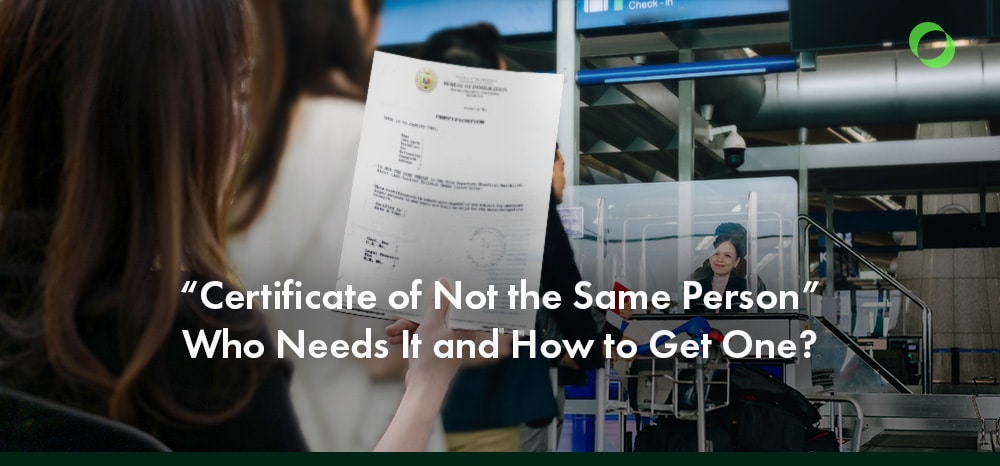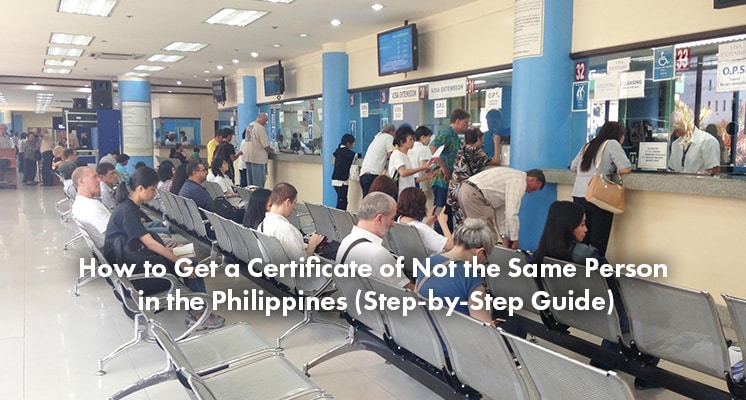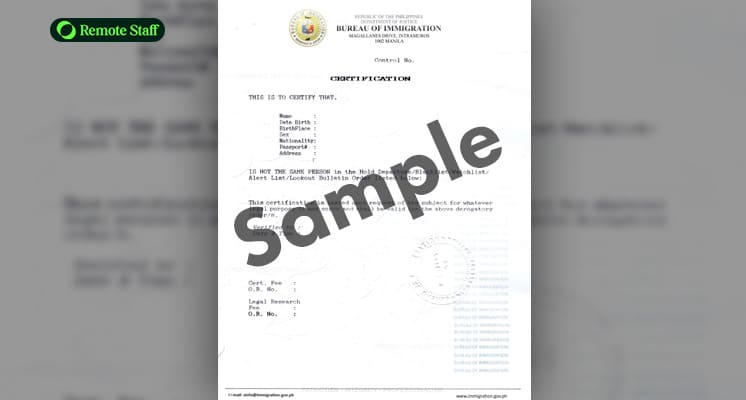If your name is Juan Dela Cruz—or any other common name—you might run into unexpected issues when applying for government documents, boarding a flight, or even passing through immigration.
In a viral video, Josh Dela Cruz shared how immigration officers flagged him because his name matched someone on a watchlist. They told him to get a Certificate of Not the Same Person (NTSP) to clear things up and prove who he really was.
Since he didn’t have the document at the time, he was pulled aside and subjected to about 15 minutes of questioning before finally being cleared. He was eventually allowed to proceed, but was strongly advised to secure the certificate before his next trip.
Another traveler, Jose Santos—a name shared by thousands of Filipinos—was held at immigration while traveling with his family.
His name matched someone with a pending case, prompting authorities to verify his identity.
Even though he had no criminal record, the process caused unexpected delays and stress. He was eventually cleared after showing valid IDs and supporting documents – and nearly missing his flight.
While their experiences may sound unusual, it happens a lot more often than you might think—especially in the Philippines, where many people share the same first and last names.
What Is a ‘Certificate of Not the Same Person’?
A Certificate of Not the Same Person (NTSP) is an official document issued by the NBI or Bureau of Immigration (BI) Philippines.
It certifies that you are not the same individual as your namesake with a Hold Departure Order (HDO), Blacklist Order (BLO), or Watchlist Order (WLO).
This certificate is especially helpful if your name shows up in a derogatory records database, as it can prevent delays or questioning during travel, background checks, or official transactions.
It’s highly recommended for travelers with common names. It helps immigration officers quickly confirm your identity to avoid confusion or worse, delays or offboarding.
Who Needs a Certificate of Not the Same Person?
You may need this certificate if your name matches someone flagged in criminal, immigration, or legal records. In other words, it’s for people with common names.
Even if you’ve done nothing wrong, a name match can cause delays, questioning, or even denied applications.
This certificate is especially useful in situations where delays in immigration identity verification or background checks can have serious consequences, such as for:
- Travelers, especially if you’ve ever been flagged at the airport before due to a name match
- Job applicants going through background checks, especially for government or security-related roles
- People submitting visa application requirements or requesting visa extension clearance, where identity verification is strict
- OFWs and seafarers, who often face strict immigration and documentation checks abroad
- People applying for passport or government-issued IDs, where background verification is required
- Bank clients or landowners who transact and/or own property in their own name.
- Anyone wrongly linked to a legal issue because of a common or similar name
If you’ve experienced unexpected delays, questioning, or document rejections, getting this certificate can help you avoid future problems.
What Happens If You Don’t Have This Certificate?
If your name matches someone on a watchlist and you don’t have a Certificate of Not the Same Person (NTSP), you could run into serious problems like:
- Travel delays or missed flights – You could be pulled aside for questioning at the airport, causing you to miss your boarding time.
- Job offer withdrawals – Employers may see a “hit” on your background check and decide not to move forward with or even rescind the offer.
- Visa or immigration issues – Your application could be delayed or denied if you can’t prove you’re not the same person in question.
- NBI clearance delays or denials – You might not get your clearance right away if your name shows up during verification.
How to Get a Certificate of Not the Same Person in the Philippines (Step-by-Step Guide)
The NTSP application process is straightforward, but you’ll need to prepare the right documents and follow each step carefully to avoid delays.
Here’s how to apply for a Certificate of Not the Same Person (NTSP) in the Philippines:
1st Step: Visit the Bureau of Immigration
Go to the BI main office in Intramuros, Manila and bring the application form.
2nd Step: Go to Window 23 and Ask to Check for a Name Match
At Window 23, tell the staff you want to apply for a Certificate of Not the Same Person.
They will check your name in the derogatory records database (including Hold Departure Orders, Watchlist Orders, or Blacklist Orders) to see if there’s a match.
3rd Step: Proceed to the Legal Division
If your name matches someone in the system, you’ll be referred to the Legal Division.
There, a staff member will guide you towards the next steps.
This may include identifying which Regional Trial Court (RTC) or legal case your name is linked to. So you can provide proof that you are not the same person.
4th Step: Go to the Regional Trial Court (RTC)
If advised, proceed to the RTC branch where the case involving your namesake is recorded.
Prepare the following:
- A notarized Affidavit of Denial, stating that you are not the person involved in the case. (Notarization fee: Around ₱100–₱500)
- Prepare the following proof of identity documents like valid government-issued IDs, your PSA birth certificate, marriage certificate (if applicable), or updated NBI clearance.
- You may also include a One and the Same Person Affidavit or Affidavit of Discrepancy if there are inconsistencies in your personal details (e.g., name spelling or birthdate).
File the documents with the court to request a clearance.
- Filing fee at RTC: Around ₱100–₱300
Once reviewed, the court will issue a signed and sealed Certificate of No Pending Case. It confirms that there are no active cases filed against you under their records.
Processing may take up to 3 working days, depending on the court’s schedule and verification process.
5th step: Return to the Bureau of Immigration (BI) to Submit Your Documents
Go back to the BI main office in Intramuros and submit all required documents, including:
- Application Form
- The Certificate of No Pending Case from the RTC
- NBI Clearance (if matched under a Blacklist or Watchlist Order)
- Valid IDs and supporting documents
You’ll also need to pay a processing fee of around ₱500.
Check this link for the full checklist of requirements.
6th step: Receive Your Certificate
After about 7 working days, return to the BI to claim your Certificate of Not the Same Person.
This certificate does not need to be renewed and can be used for future travels or transactions—unless your name is flagged again or new records are added that cause another identity match.
Here’s a Not the Same Person certificate sample:
Case Study: “How a Traveler Was Mistaken for Someone Else”
Josh Dela Cruz, a content creator, was stopped by immigration while traveling to Hong Kong. He was held for about 15 minutes because his name matched someone else’s on a watchlist.
Although he was eventually allowed to board, he was advised to secure a Certificate of Not the Same Person to avoid similar issues in the future.
Similarly, MishLimSTAR shared on YouTube how she was flagged at the airport before a family trip to Japan.
Despite having a different middle name and birthday, she was held for questioning because the immigration system only displayed her first and last names—just like the person with a record.
After a short interview and presenting her documents, she was cleared for travel. Like Josh, she was also advised to get the certificate to prevent future delays.
In both cases, A Certificate of Not the Same Person could have helped the parties above avoid delays, missed flights, and extra stress.
Tips to Avoid Mistaken Identity Issues
If your name is too common or has ever triggered a match in official systems, it’s best to be proactive to avoid name similarity issues and protect yourself:
- Always carry valid and updated government-issued IDs
- Double-check your NBI clearance results for any name matches
- Include your full name, middle name, and suffix (if any) in all official forms
- If you’ve ever been flagged by immigration due to having the same name as someone with a record, secure a Certificate of Not the Same Person before your next trip
These small steps can help you breeze through immigration identity verification or background checks.
Frequently Asked Questions
Got questions about the Certificate of Not the Same Person? Here are some quick answers:
What agencies issue this certificate?
The Certificate of Not the Same Person is issued by the Bureau of Immigration.
Is the certificate valid permanently?
The Certificate of Not the Same Person doesn’t officially expire. However, you may need to get a new one if your name gets flagged again.
Can I get it online or do I need to appear personally?
You cannot apply online for the Certificate of Not the Same Person. You (or your authorized representative) must appear in person at the BI Main Office in Intramuros for submission and processing:
Applications are only accepted and processed at the BI’s main office for security and consistency.
If you cannot go personally, you can authorize someone else (e.g., a lawyer or family member) to apply on your behalf—but they must present a Special Power of Attorney (SPA) and a valid ID.
How much does it cost?
The total cost to get a Certificate of Not the Same Person is around ₱700 to ₱1,300, depending on your case. This includes:
- Notarized Affidavit of Denial: ₱100–₱500
- RTC filing fee: ₱100–₱300
- Bureau of Immigration processing fee: ₱500
Prices may vary slightly by location or urgency.
What if I lost my certificate—can I get another copy?
Yes. You can apply for a new NTSP certificate if you misplace the original.
The Certification & Clearance Section doesn’t reissue certified true copies. Howeever, you can apply for another original copy at the BI Intramuros office.
Conclusion: Stay Ready, Avoid Delays
The Certificate of Not the Same Person is a simple but important document that can save you from travel delays, rejected applications, or prolonged questioning—especially if you have a common name that matches someone with a record.
If you’ve ever been flagged before, getting this certificate can save you from a lot of unnecessary stress next time—whether you’re traveling, job hunting, or working remotely.
This is even more important if you’re aiming for a digital nomad lifestyle,are observing work-from-anywhere policies, or exploring location-independent jobs where background checks are common.
So if you’re ready to start working from home or a virtual workplace anywhere in the world, Remote Staff connects Filipinos with legit remote work opportunities in customer service, admin support, accounting, and more.
Register today!





